10 conclusions from the 2019 UCI Road World Championships
Our writers break down the major talking points from an eventful Yorkshire Worlds
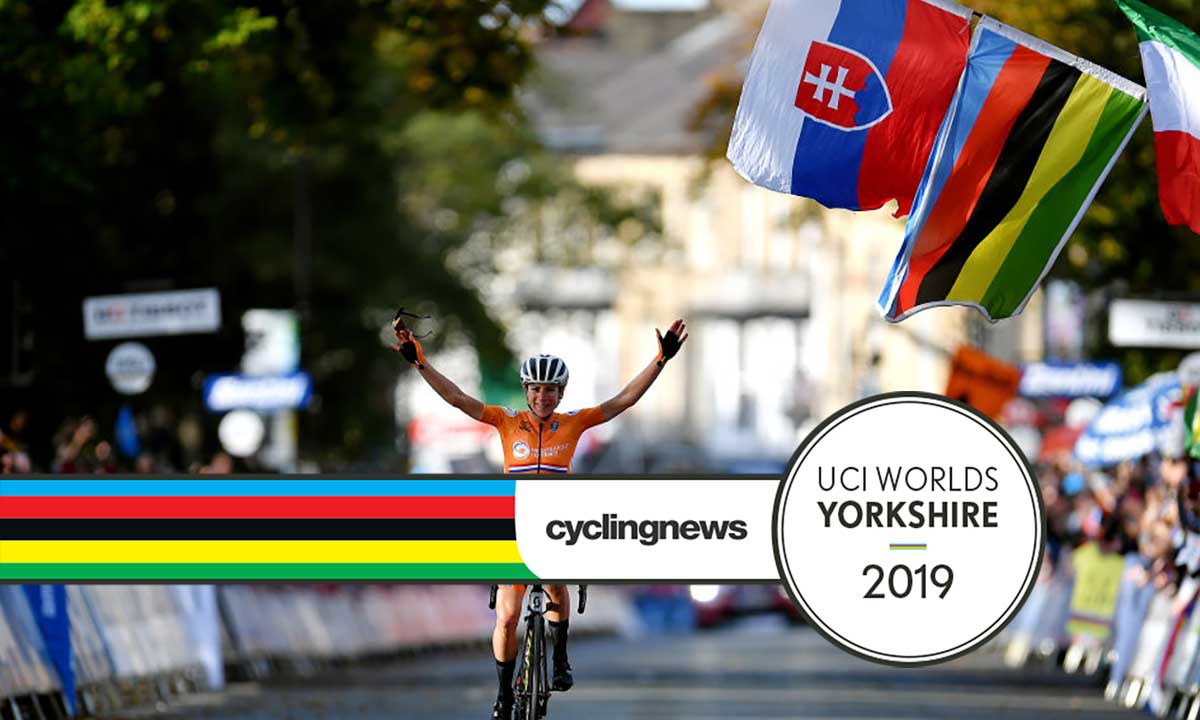
1. Yorkshire 2019: Great expectations
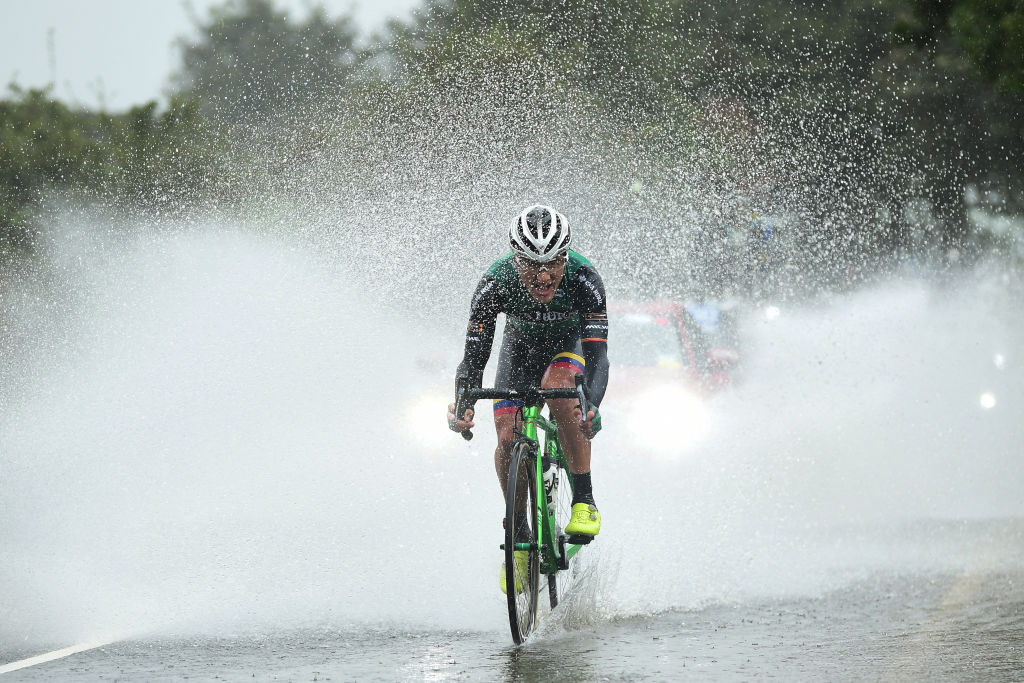
There were great expectations ahead of the 2019 UCI Road World Championships in Yorkshire, and rightfully so – the area is a well-known host of international cycling events such as the annual Tour de Yorkshire and the Grand Départ of the 2014 Tour de France.
The courses were exceptional and the racing itself was action packed. Unfortunately, the organisation of the whole event sometimes seemed to come apart at the seams.
The UCI only compounded the problems by trying to strictly apply their rule book – rules that will now surely have to change in the future.
Much of the chaos and controversy surrounding the race was out of anyone’s control. Mother nature had her way as heavy rain caused dangerous sections of standing water on the course, forcing organisers to re-route and delay events, while low cloud cover grounded helicopters needed for high-quality live broadcasting. The adverse weather conditions stretched resources and ignited contingency plans that were set in place to keep the events moving forward in unexpected situations.
The rain wasn’t completely unexpected, however. After all, Britain is known for its weather, particularly in Yorkshire in September, leading many to believe that the event organisers weren’t as prepared as they ought to have been.
2. Danish coffee club 2.0
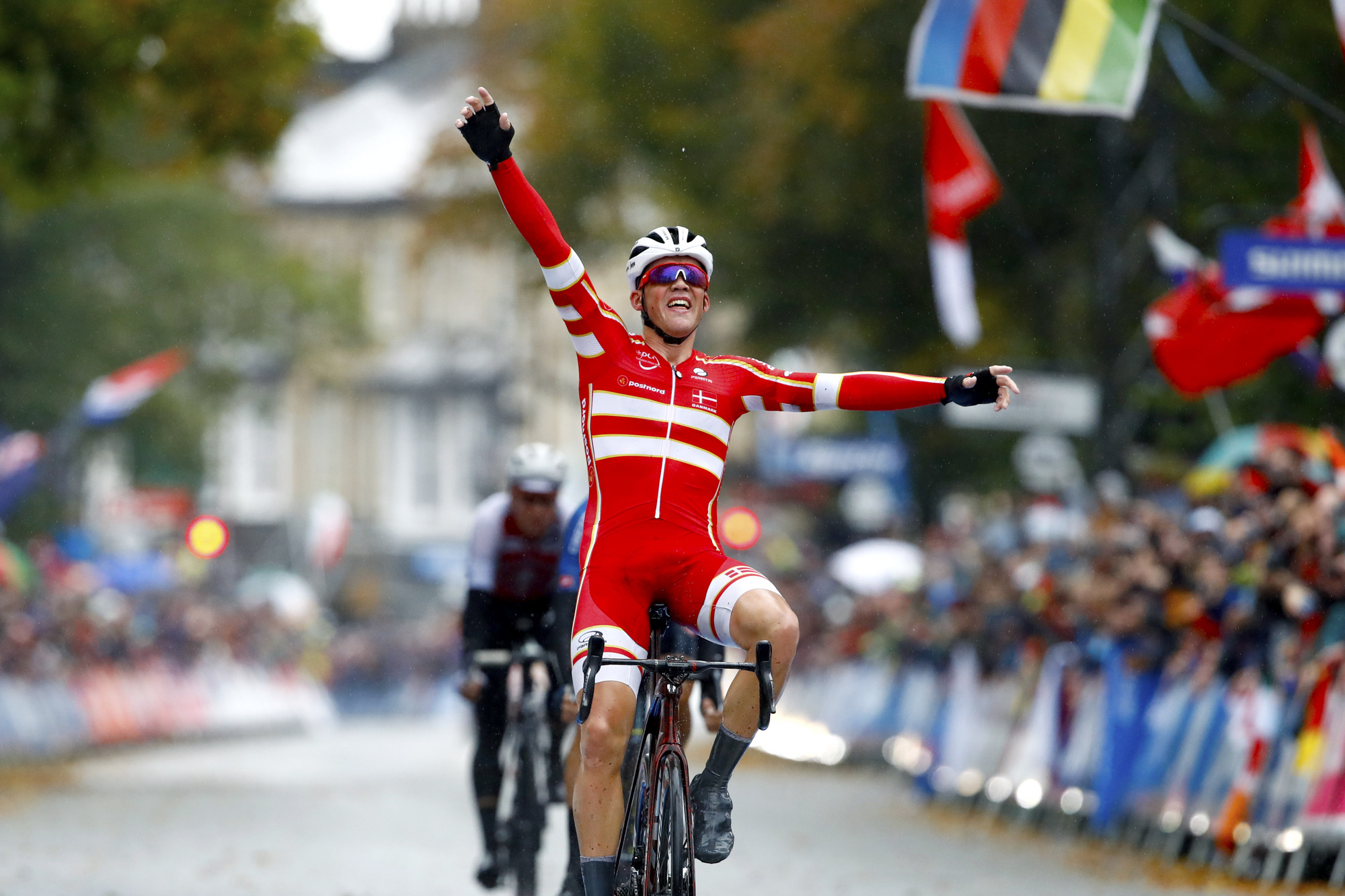
Few, if anyone, had Mads Pedersen on their list of favourites for Sunday's road race but, 20 years after Spain's Óscar Freire became a shock world champion, a young Dane was repeating the feat with a performance that was both as dynamic as it was authoritative.
The original plan was for Pedersen to soften up the opposition for Jakob Fuglsang and Michael Valgren later in the race, and few – including the likes of Slovakia's Peter Sagan and Belgium's Greg Van Avermaet – were genuinely worried when the Dane skipped clear and helped form a group that contained Stefan Küng (Switzerland) and Gianni Moscon (Italy). The group was strong, but still lacked a true out-and-out favourite.
Get The Leadout Newsletter
The latest race content, interviews, features, reviews and expert buying guides, direct to your inbox!
When Moscon's teammate Matteo Trentin and the Netherlands' Mathieu van der Poel joined the fray, however, the situation dramatically changed, and within a blink of an eye the winning group had been formed. Pedersen cannot be credited with the fact that two real contenders joined the action out front, but the way in which he kept his head and then overpowered Trentin provided evidence of a rider with all the makings of a deserving holder of next year's rainbow jersey.
The win also signified Denmark's first male road winner in the elite race, and, in Valgren and Fuglsang, the Nordic nation has two relatively recent Classics winners. With Magnus Cort, Søren Kragh Andersen, Michael Mørkøv, Chris Juul Jensen, and Kasper Asgreen all on the scene, this is arguably Denmark's best crop of riders in years. The 'Danish coffee club' of the 1980s and 1990s is firmly back. (DB)
3. UCI makes a mockery of U23 road race
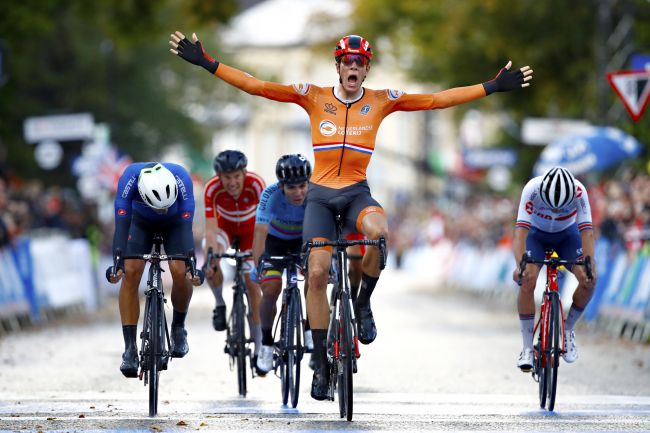
We've been through some of the organisational headaches faced by Yorkshire 2019, some of which were a shame but, ultimately, forgivable. Looking at the officiating from the UCI, the farce of the U23 men's road race was not.
We could spend hours debating whether the two minutes Nils Eekhoff spent behind his team car warranted disqualification or not. Opinions are split, and the wilful ambiguity of the UCI rulebook hardly helps us reach a consensus. In a way, however, that's not the point.
Eekhoff should either have been disqualified at the time or not at all. The UCI stated they had to wait until the conclusion to review the footage, but taking action four hours after the fact made a mockery of the race.
By that point, Eekhoff had been instrumental in dragging a chase group back to the front to set up a seven-man sprint. Removing him from the results does not remove the influence he had on the course of events. It's like disallowing a goal for offside after the full-time whistle; even in the mad world of football, a result would never be changed in that way.
Boos rang out when the decision was announced to the Harrogate public, and their response was understandable. They'd witnessed a great race of high drama but had, in a way, suddenly been robbed of their experience. As they filed away, it was hard to get away from the sense that, although Samuele Battistella was the world champion, he was the winner of a race that didn't really take place. (PF)
4. Annemiek van Vleuten: 104km of crazy
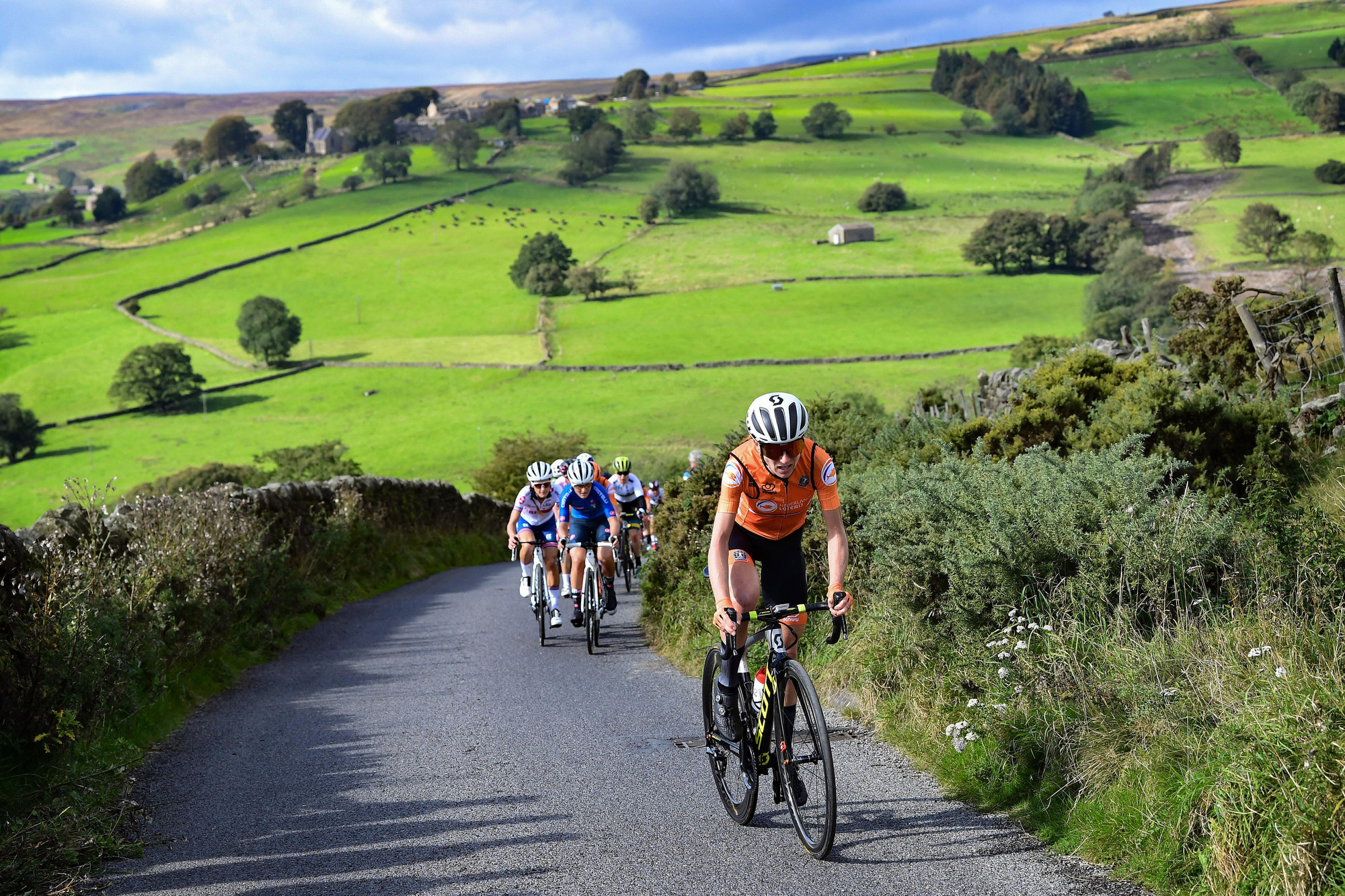
Annemiek van Vleuten has proven her strength time and time again, such as at the Giro Rosa (twice) and Liège-Bastogne-Liège, but no one expected her to attack solo for 104km to win the elite women's world title in Harrogate – not even her. She made her winning move over the Lofthouse climb only 45km into the 150km race.
Not even a chase group of Great Britain's Lizzie Deignan, Chloe Dygert Owen (USA), Denmark's Cecilie Uttrup Ludwig, Clara Koppenberg (Germany) and the Italian duo of Elisa Longo Borghini and Soraya Paladin could put a dent in Van Vleuten’s advantage.
Her Dutch teammate Anna van der Breggen was also in the chase but had the luxury of sitting back and skipping turns, and ended up securing the silver medal.
At first, Van Vleuten thought the early move was "stupid" and hoped some strong riders would bridge across. That didn’t happen, though, and so she settled into a rhythm and her gap stretched out. She fully committed when she hit the finishing circuits with nearly two-and-a-half minutes, and the astounding effort paid off with her first world title in the road race.
She attributed her success to hard work, altitude training, joining the Mitchelton-Scott men's squad for training camps, and a little bit of craziness. It was an extraordinary performance that will go down in history.
5. Dennis: Talent unquestionable, future uncertain
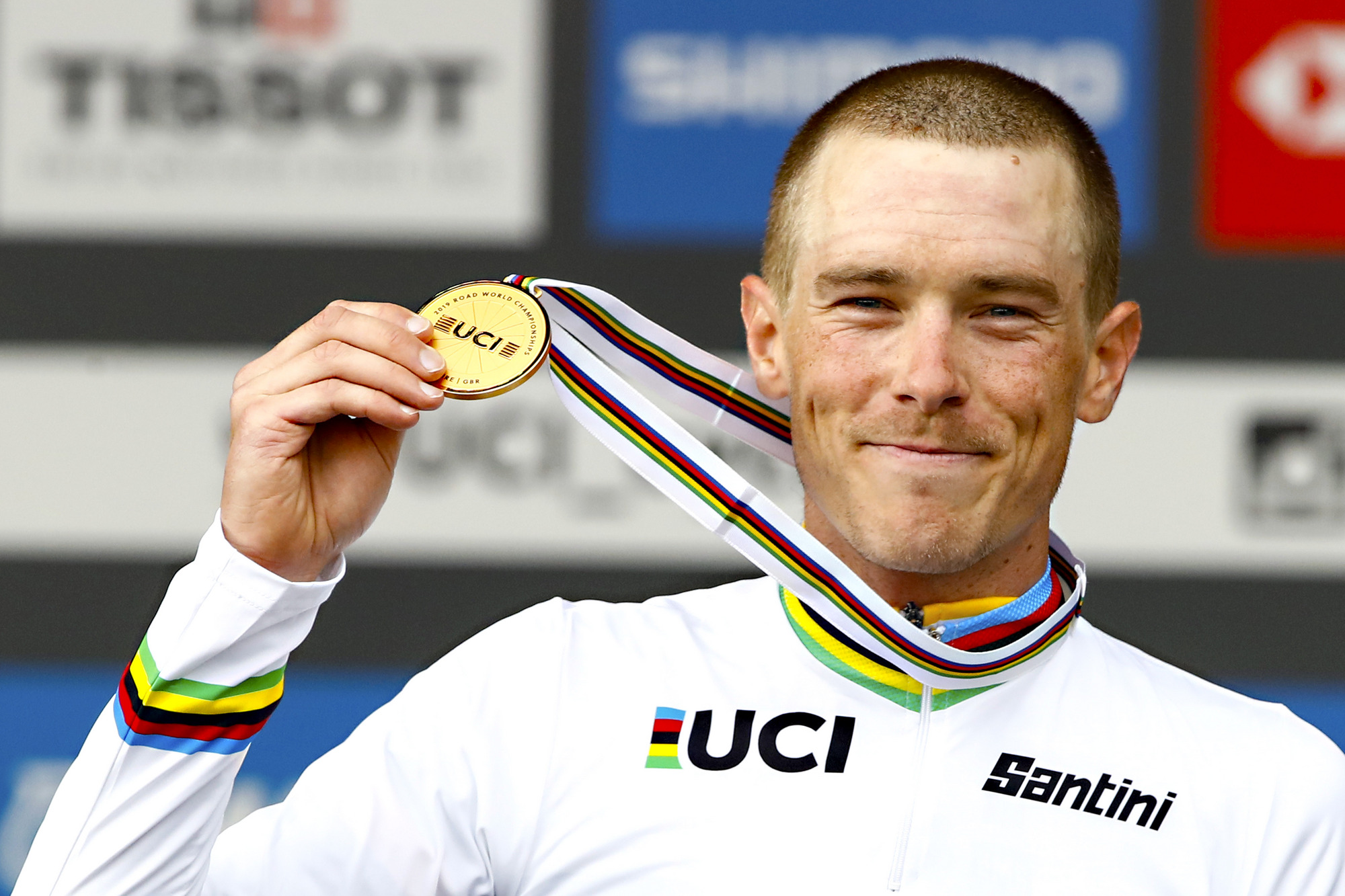
By retaining his world time trial title, Rohan Dennis reminded everyone of his pure class on a bike. However, talent has never been the issue with the Australian, and question marks over his temperament still linger after his controversial decision to walk out on his Bahrain-Merida team midway through this year's Tour de France.
Even though we now know that his contract was terminated before the World Championships began, the sight of him riding BMC bikes in both the road race and time trial will have brought July's actions flooding back to any potential suitor.
It has taken 10 weeks of negotiations, but Bahrain-Merida and Dennis are now free of each other, and while arbitration is the next step, the TT world champion has a rather difficult task in persuading another team to pick him up for 2020.
Bike manufacturers with clout within squads will look at the Merida case study with trepidation, and general managers will be concerned with how they could possibly integrate Dennis into their squads. For instance, would a team be willing to sign a rider who could end up walking out of a race because they were unhappy with the equipment provided?
There's obviously a lot more to Dennis's situation than a centimetre here or there on a skin suit, and Bahrain-Merida are certainly not guilt free in how the last few months have played out, but reputations in cycling are quicker to create than they are to break down.
That said, we are still talking about a rider of immense talent, and his rainbow jersey will attract attention, no matter what. There are some squads that suit Dennis better than others but, depending on what he wants to do, there could be an option for him to remain with the national programme until the Tokyo Olympics come around. That might cost him in a financial sense, but it would certainly allow him to have the space and environment he needs. (DB)
6. Dygert: The new face of women's cycling
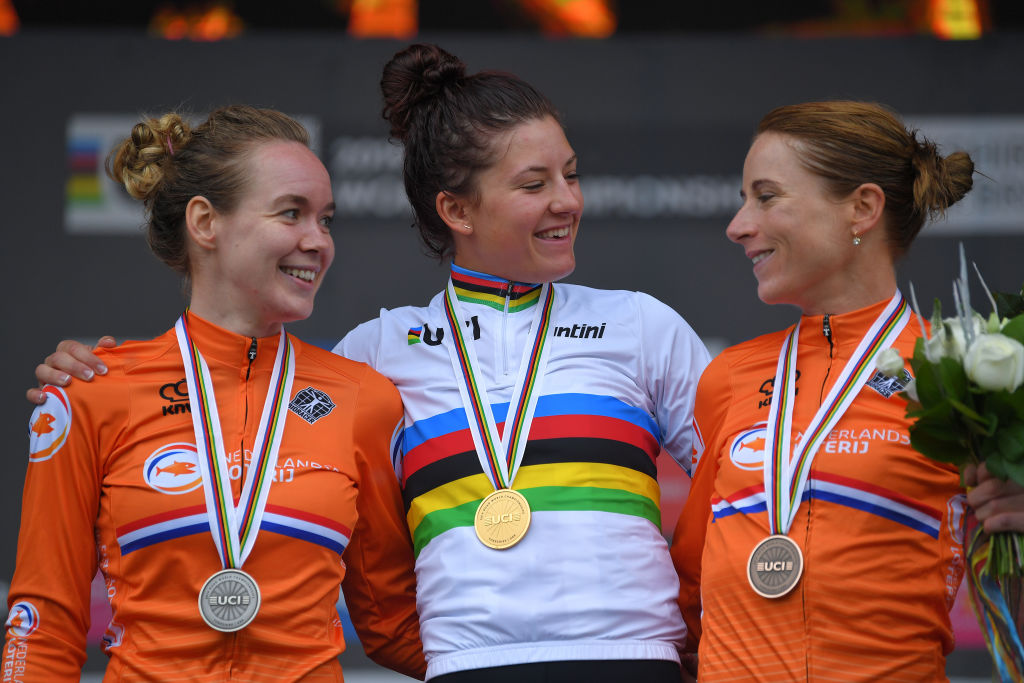
Chloe Dygert has instantly become the new face of women’s cycling after winning the elite women’s time trial more than a minute-and-a-half ahead of Anne van der Breggen and Annemiek van Vleuten.
She was the double world champion in the junior time trial and road race in 2015, but has since spent most of her career on the track, where she is a five-time world champion in the Individual and Team Pursuit.
The 22-year-old American is coached by Kristin Armstrong, who is a two-time world champion and three-time Olympic gold medallist in the time trial, and has taken a decidedly similar approach to her own career. She isn’t interested in competing on the Women’s WorldTour or for a big women’s team.
She envisions spending her career focused on the time trial and track events at the two most important venues: the World Championships and the Olympic Games. (KF)
7. The future is bright for the USA
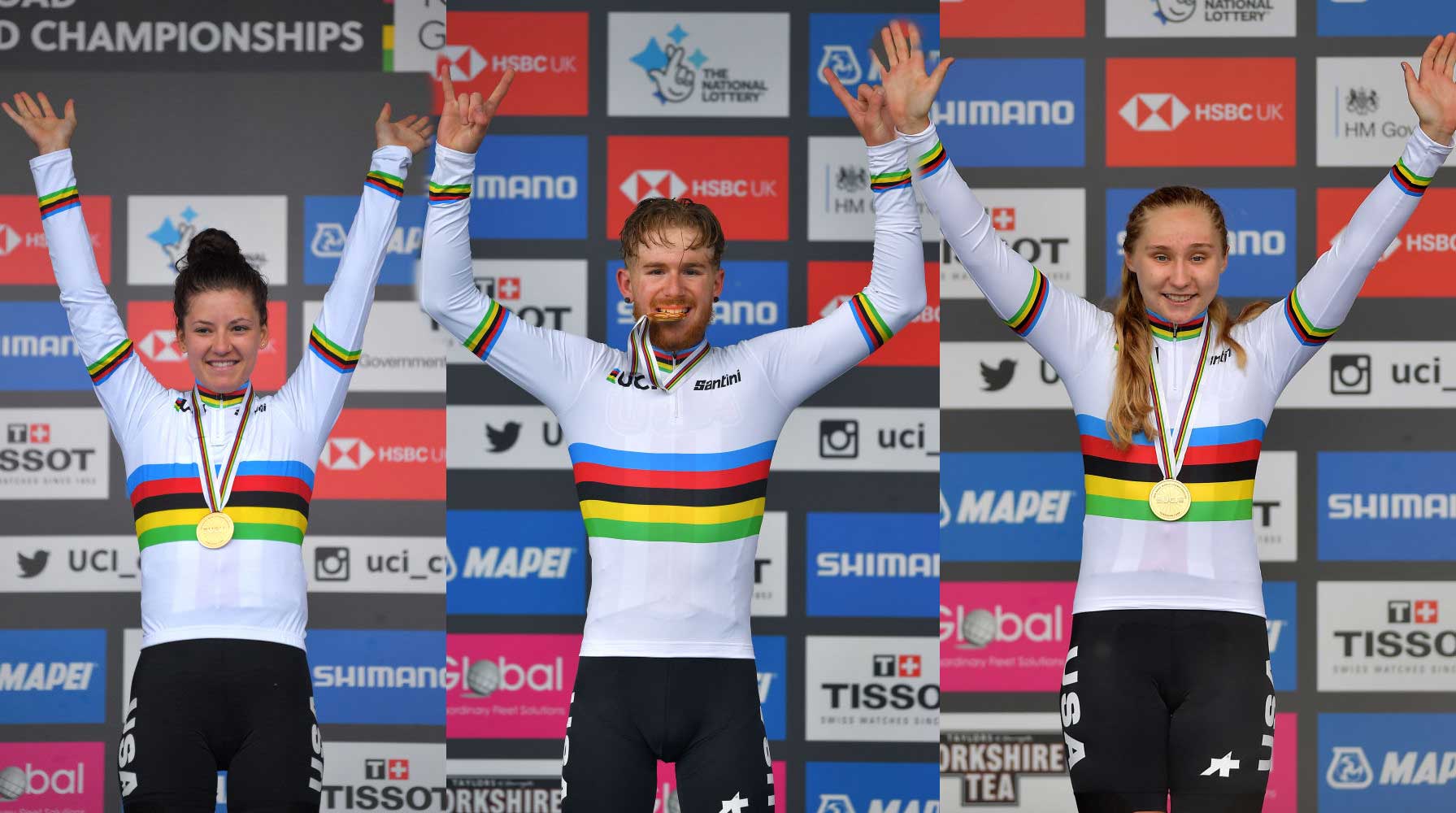
Topping the medal table with three gold, one silver, and two bronze, the USA enjoyed their most successful ever World Championships. At their home Worlds in Richmond four years ago, they won one more medal but one less world title. The format of the Worlds has evolved over the years, making direct comparisons tricky, but they've never had three golds (sorry – we're not counting BMC's TTT victory in Richmond as a US title).
There have been flashes of success for the USA in recent times, but a general sense of underperformance and a hangover from the fall of Lance Armstrong in 2012. The tide seems to be turning, however, and optimism growing, with Yorkshire evidence of a wave of talent coming through.
Even Chloe Dygert – who has followed through from her junior road race-time trial double in 2015 – can be considered part of that, still just 22 and with big prospects on the road.
USA Cycling hailed Yorkshire as proof that efforts to improve its development programme are working. It's hard to argue against. One of the problems has been creating pathways to what is largely a European sport, but, looking at the junior men's road race, both the winner Quinn Simmons and bronze medallist Magnus Sheffield have been able to race extensively in Europe this year with the national set-up.
"Even though the story is this amazing kid Quinn, it's also this amazing kid Magnus – he's the guys you'll all be talking about next year – and then the year after it'll be this amazing kid [Matthew] Riccitello," Roy Knickmann, manager of the highly-fruitful LUX Cycling development team, told Cyclingnews.
"There are going to be more and more of these guys, because we finally have the development side figured out. We've broadened the base of US junior cycling tremendously, and I think that's going to help five years down the line for the US."
The future is bright. (PF)
8. Yorkshire courses made for great racing
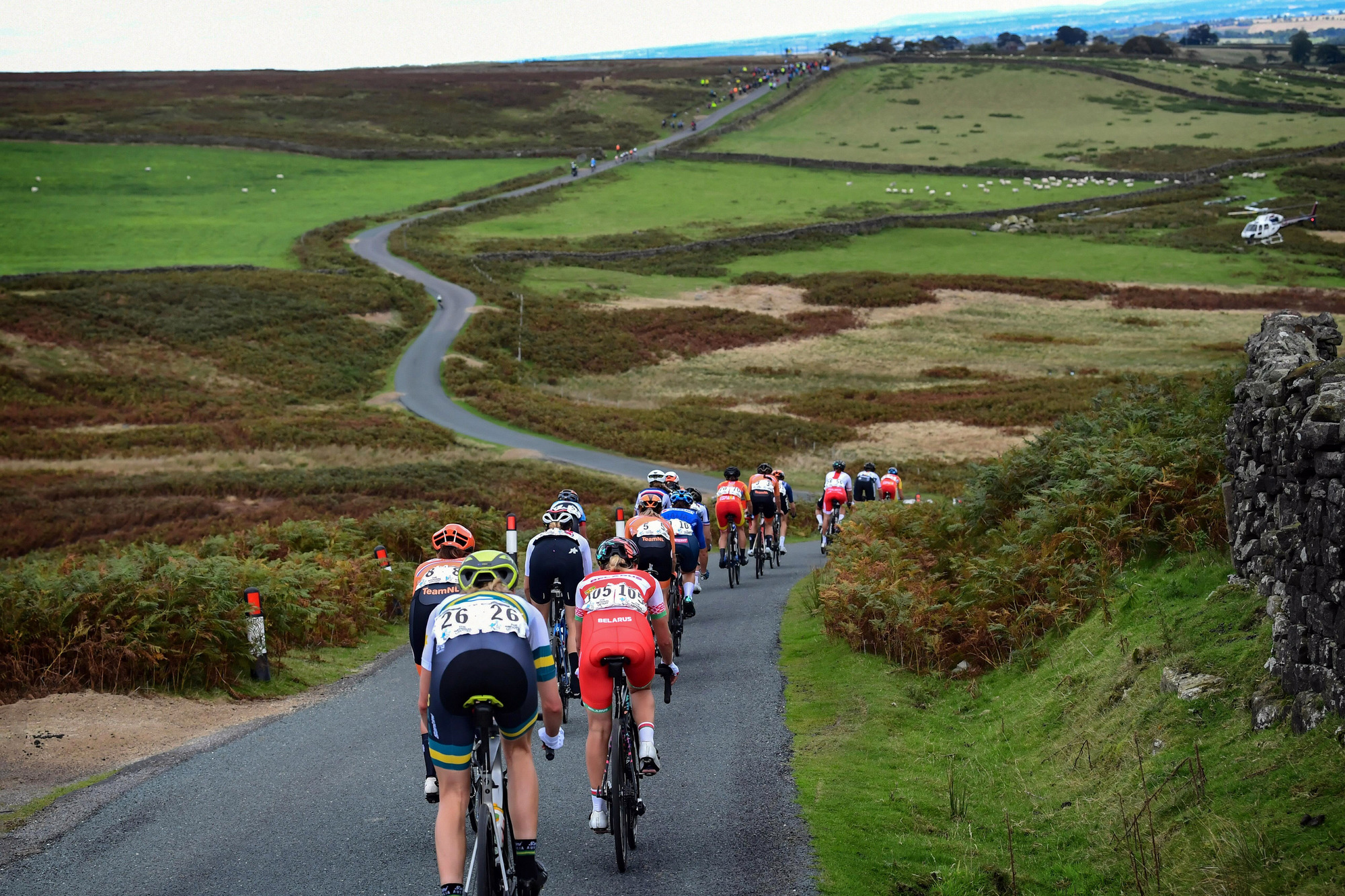
Unless you're specifically designing a course for a sprinter (2011) or a climber (2018) your aim is to provide a parcours that's well balanced and provides enough opportunities to attract an array of world-class riders. There's no point in designing a route that puts half the peloton off before a pedal has even been pushed in anger.
As a course director you want a route that also keeps the action spread throughout and not just a procession before an exciting but short finale. In a number of ways, Yorkshire provided an excellent route and the fact that none of the road races followed the exact same script was testament to that.
We had a crazy long break from Van Vleuten, a couple of small groups deciding finishes but formed at different points, and plenty of action in between.
The weather obviously played a massive factor in deciding the men's race – or at least how it was raced – and we'll never know if the men's race would have split earlier had the course not been cut short but, overall, teams and riders had to concentrate throughout each and every event.
Bar the fact that Van Vleuten effectively nullified most of the women's peloton, Yorkshire provided a fantastic glimpse of what racing on British roads is all about. Grippy tarmac, punchy climbs, tight roads and unpredictable, often tense, racing. We may have lacked a proper focal point – such as a race defining climb – but in a sense that made for better racing. (DB).
9. Team time trial mixed relay in line with Olympic Movement
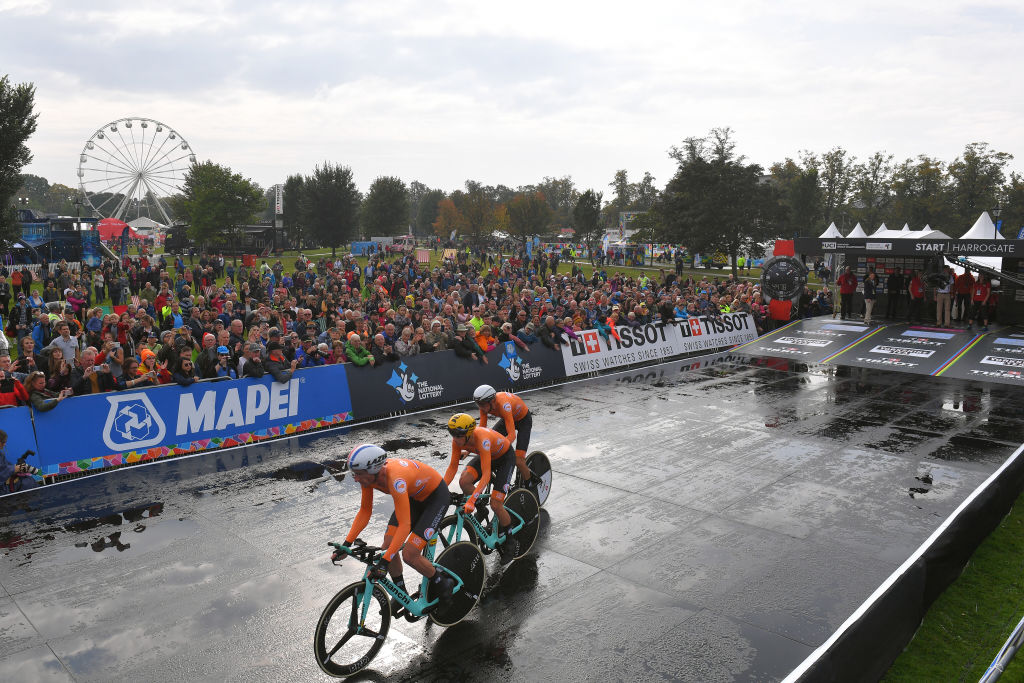
The Netherlands won the first-ever team time trial mixed relay at the World Championships in Yorkshire. The event controversially replaced the trade team trial and instead saw national teams competing with two separate teams consisting of three male riders and three female riders, whereby their combined times are taken to determine the winning nation.
It was the first form of co-ed racing at the modern World Championships. The event seemed to be in line with the International Olympics Committee (IOC) push for gender equality and it has included 18 mixed gender events to the schedule at the Tokyo Olympics Games.
The UCI hinted it wants to see the new team time trial mixed relay added to the schedule of events at the future Olympic Games.
The verdict: The first-ever team time trial mixed relay was an interesting new format, the riders enjoyed the new race, and it was popular amongst the fans. However, it will take some time to draw in participation from more nations and some athletes would prefer to see the return of the trade team time trial.
10. Soul searching ahead for Belgium and France
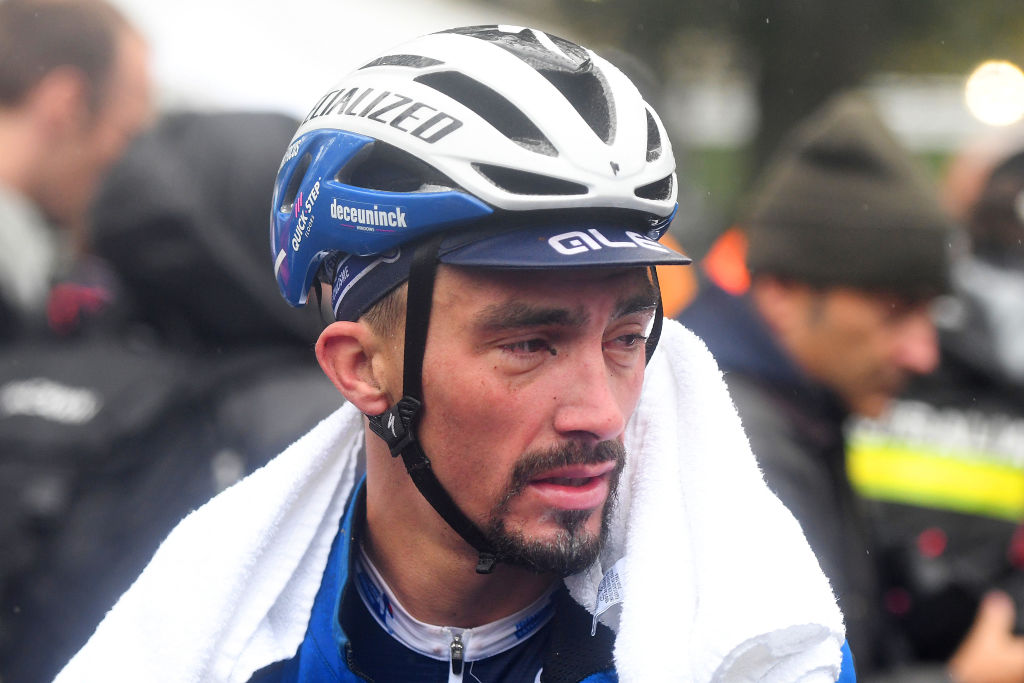
Italy, Belgium, the Netherlands and France are far and away the 'big four' when it comes to the history of the World Championships. Even though the USA topped the Yorkshire medal table, the Netherlands and Italy held up their end of the bargain, with two titles apiece among respective hauls of eight and five medals. Belgium and France, however, fell flat.
For the first time since 2010, France did not win a single medal. What's more, their best result from the whole week was Lea Curinier's eighth place in the junior women's road race, with only one other top 10 finish.
Julian Alaphilippe struggled in the wet conditions in the men's road race, where France were without Romain Bardet, Thibaut Pinot, Warren Barguil and Pierre Latour. Those riders have formed something of a new generation but there will be concern about the complete lack of impact further down the categories.
Belgium, meanwhile, collected two silver medals, one in the junior women's road race through Julie De Wilde and the other in the elite men's time trial through Remco Evenepoel – a result that has to be considered a huge achievement given his 19 years of age.
However, Belgian success as a whole largely depended on the elite men's road race. With a team packed full of Classics specialists and potential winners, they were expected to dominate, if not win, but Philippe Gilbert crashed and the rest had to admit they were not good enough.
"Expectations reached heaven. But at the world championship, the Belgians didn't even reach the low cloud cover over Yorkshire," wrote Marc Ghyselinck in Het Laatste Nieuws. "Tactical plans fell into the water, which was falling out of the sky, and physically the Belgians went down. What a disgrace."
There will be some soul searching ahead for two of cycling's major nations. (PF)
Patrick is a freelance sports writer and editor. He’s an NCTJ-accredited journalist with a bachelor’s degree in modern languages (French and Spanish). Patrick worked full-time at Cyclingnews for eight years between 2015 and 2023, latterly as Deputy Editor.
